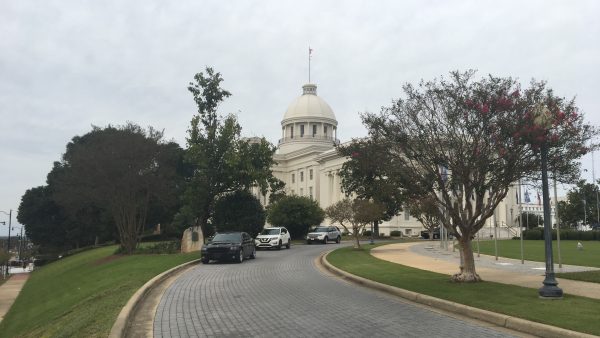Alabama Lawmakers Approve $5 Million For Coronavirus Response
When the Alabama legislature began meeting last month, coronavirus wasn’t on lawmakers’ radars. This week that completely changed. State health officials said Friday at least five Alabamians have tested positive for COVID-19, Gov. Kay Ivey declared a state of emergency and announced plans to close schools for more than two weeks. Don Dailey, host of Alabama Public Television’s Capitol Journal, explains what action the legislature took this week related to coronavirus and other matters.
Coronavirus Response
State Health Officer Dr. Scott Harris told lawmakers this week up to $10 million dollars in federal money is on the way to support testing for the coronavirus, but in the meantime state funding is needed. Lawmakers passed and Ivey signed an emergency $5 million appropriation for the Alabama Department of Public Health Thursday. Harris says some of those funds will go toward creating 20 to 25 testing sites around the state.
Dailey says lawmakers are concerned about keeping state government functioning if the outbreak escalates.
“Gov. Ivey earlier this week issued directives to state department heads about how to respond and at the same time keeping their agencies running without interruption as much as could be possible given the unknowns surrounding the virus,” Dailey says.
Prison Bills
A package of bills related to Alabama’s troubled prison system advanced from committee this week. The Department of Corrections is under pressure from the U.S. Department of Justice to deal with prisons that have excessive violence, are overcrowded and understaffed.
One bill would require prison officials to issue regular reports to a legislative prison oversight committee. Another bill would create a deputy corrections commissioner for rehabilitation.
“Rehabilitation is seen as key in correcting some of our prison problems both after prisoners are released and even before with community corrections so that maybe some of these people never end up in prison,” Dailey says. “Once we come back from spring break we expect to see those move through the legislative process pretty quickly.”
Medical Marijuana
The Senate gave approval to a medical marijuana bill Thursday on a 22 to 10 vote. The measure would allow people with certain conditions to take medical marijuana, although it could not be in a form that’s smoked or eaten.
“The debate was very spirited as you might imagine. This has always been a very divisive issue,” Dailey says.
A medical marijuana bill passed the Senate last year, but died in the House. Dailey says lawmakers have taken issue with many parts of the plan from registries for patients and doctors to dosage to the farmers who will cultivate the cannabis.
“Then there’s the argument that predominated last year that was back this year: is this a gateway to increased use of recreational marijuana use in the state.” Dailey says. “[This] continues to be a very contentious issue.”
This quiet epic is the top-grossing Japanese live action film of all time
The Oscar-nominated Kokuho tells a compelling story about friendship, the weight of history and the torturous road to becoming a star in Japan's Kabuki theater.
The Live Nation trial could reshape the music industry. Here’s what you need to know
On Tuesday opening statements will begin for the federal antitrust trial against Live Nation, one of the largest entertainment companies in the world.
A new one-a-day-pill holds promise for HIV’s ‘forgotten population’
It's designed to take the place of complicated, multiple drug regimens that many people with HIV need to follow. And it's also beneficial because the HIV virus is always evolving.
For filmmaker Chloé Zhao, creative life was never linear
Director Chloé Zhao used meditation, somatic exercises and dance to inspire the cast and crew of this Oscar-nominated story about William Shakespeare's family.
10 new books in March offer mental vacations
March is always a big one for books – this year is no different. We call out a handful of upcoming titles for readers to put on their radars — offering a good alternative to doomscrolling.
Sen. Chris Coons, D-Del., talks about the war with Iran and upcoming war powers vote
NPR's A Martínez asks Delaware Democrat Chris Coons, a member of the Senate Foreign Affairs Committee, about the war with Iran.







